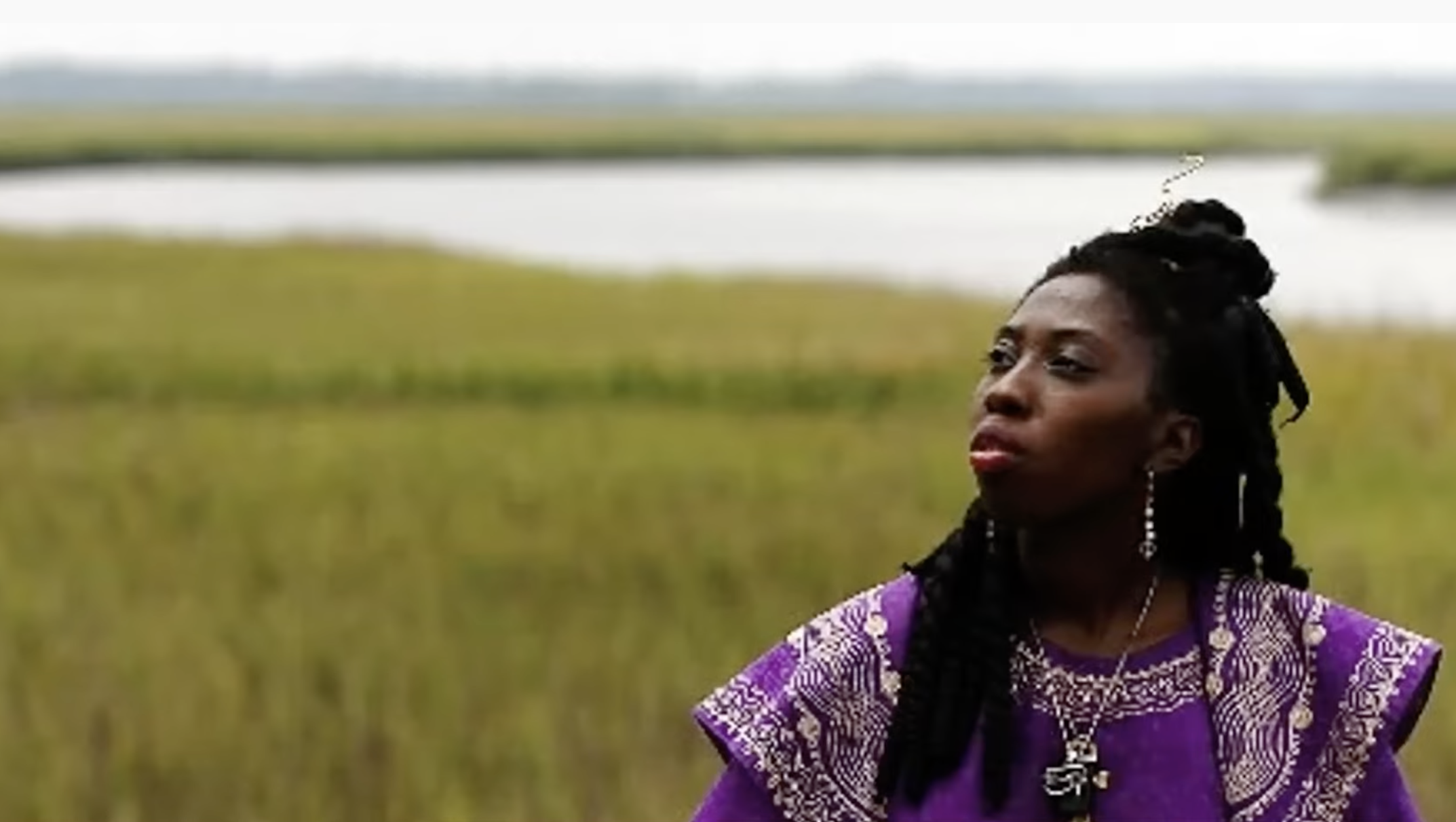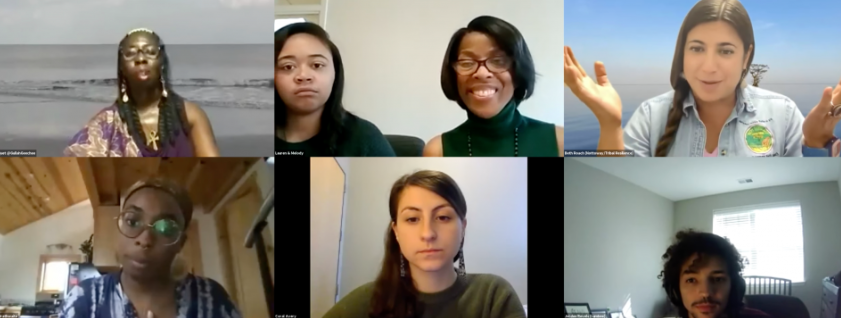Global Change Seminar Summary: Stories of Culture and Adaptation


This post was written by 2021-22 Global Change Fellow, Stephanie Kelly, summarizing the final event in the fall Global Change Seminar series, Stories of Culture and Adaptation, on November 2, 2021. The discussion was moderated by Global Change Fellows Lauren Pharr, Stephanie Kelly, Alex Nelson, Courtney Hotchkiss, and Melody Hunter-Pillion.
View a recording of the discussion.
Keynote Message:
EPA Administrator Michael Regan: Michael S. Regan serves as the 16th Administrator of the United States Environmental Protection Agency. He is the first Black man and second person of color to lead the U.S. EPA. Prior to his nomination as EPA Administrator, Michael Regan served as the Secretary of the North Carolina Department of Environmental Quality. As Secretary, he spearheaded the development and implementation of North Carolina’s seminal plan to address climate change and transition the state to a clean energy economy. Under his leadership, he secured the largest coal ash clean-up in United States history. He led complex negotiations regarding the clean-up of the Cape Fear River, which had been contaminated for years by the toxic chemicals per- and polyfluoroalkyl substances (PFAS). In addition, he established North Carolina’s first-of-its-kind Environmental Justice and Equity Advisory board to better align social inequities, environmental protection, and community empowerment. View a recording of the full keynote address by Michael Regan.
Keynote Panelist:
Queen Quet | Chieftess and Head of State of the Gullah/Geechee Nation: Marquetta Goodwine is a published author, computer scientist, lecturer, mathematician, historian, columnist, preservationist, environmental justice advocate, environmentalist, film consultant, and “The Art-ivist.” She is the founder of the premiere advocacy organization for the continuation of Gullah/Geechee culture, the Gullah/Geechee Sea Island Coalition. Queen Quet has not only provided “histo-musical presentations” throughout the world, but was also the first Gullah/Geechee person to speak on behalf of her people before the United Nations in Genevé, Switzerland. Queen Quet is a directorate member for IHRAAM and for the International Commission on Human Rights.
Panelists:
Beth Roach | Nottoway Tribe | Tribal Resilience Coordinator, North Carolina Commission on Indian Affairs: Beth is a citizen of the Nottoway Tribe, a co-founder of the Alliance of the Native Seedkeepers, and a storyteller. She serves as the Tribal Resilience Coordinator for the North Carolina Commission on Indian Affairs and was recently elected to Vice Chair of the Tribal Council.
Jorden Revels | Lumbee Tribe | Organizer for NC WARN: Jorden is a member of the Lumbee Tribe, a former Grassroots Organizing Fellow at Friends of the Earth, and a Community Organizer for NC WARN. While pursuing a dual-major in Psychology and American Indian Studies at UNC-Pembroke, he was a prestigious Udall Scholar and former student government Vice President.
Kaylah Brathwaite | US Virgin Islands | Youth & Zero Hour Activist: Kaylah is a 20-year-old Special Projects Operations Associate at March On, and former Director of Operations at Zero Hour. A St. Croix, US Virgin Islands native, she recently wrote an op-ed piece for Teen Vogue titled, My Home is Already Being Destroyed by Climate Change.
Coral Avery | Shawnee Tribe | Natural Resource Specialist for the Bureau of Indian Affairs Tribal Climate Resilience Program: Coral is a citizen of the Shawnee Tribe, and a Natural Resource Specialist for the Bureau of Indian Affairs Tribal Climate Resilience Program. They also serve as Tribal Youth & Climate Liaison at the Northwest Climate Adaptation Science Center.
Synopsis
In celebration of the SE CASC Global Change Fellow Program’s 10th anniversary, the 2021-2022 cohort of Global Change Fellows brought together a stellar lineup of keynotes and panelists to discuss culture, climate change adaptation, and the power of story, particularly for marginalized communities who are often the most impacted. Learn more about the 10th anniversary of the SE CASC Global Change Fellows program.
Memorable Quotes
EPA Administrator Michael Regan:
“EPA just released a report that shows that the most severe harms from climate change fall disproportionately upon underserved communities who are least able to prepare for and recover from climate disasters, and at EPA, we are working hard to embed environmental justice into our DNA”
“If there were ever a moment when we could break the pattern of environmental injustice that has long plagued this country, I believe that moment is now. But the truth is we need you, we need all of you, every single one of you. We need your courage, we need your compassion, we need your sense of justice, and we need your ambition. And that’s why interdisciplinary programs like Global Change Fellows are so important to our movement. They show what is possible when people of diverse backgrounds and areas of expertise come together to lift up the stories of marginalized communities and to fight for the change that we all deserve.”
Queen Quet:
“That space of the middle passage that our ancestors came through bringing our language, bringing these agrarian traditions, bringing our cultural heritage that is Gullah/Geechee was not something that should be erased. There was nothing we needed to really adapt to, we didn’t need to be reassembled because God made us who we are.”
“And so, of course, when they came in, they came in marching in like government people do. They march in, they march in with a checklist, they march in with a workbook, but we don’t work from your book. We work from our circle, we work from our culture, we are the living book. And so, we had to then take them out of a very linear behavior and into a circular behavior, where everybody’s knowledge is valued and it’s a shared experience, but where you don’t trample on my humanity… Don’t try to extract from me that, which is not for you… And that is critical, so that intergenerational learning happens in all the work that we do with the Gullah/Geechee Sea Island Coalition and through our Gullah/Geechee Sustainability Think Tank. We try to truly teach community participatory collaboration, not just research which can tend to be extracted, and be exploitive… So do not come into the Community marching in to get and take out, but [rather] sit with the community and learn what we can co-create.”
Beth Roach:
“On that land are so many of our archaeological sites, our village sites, and you have evidence of where we were living on the outer banks of Carolina, Eastern shore Virginia, all the way down the coast, and really all around Turtle Island. We’ve been living on these shorelines for hundreds and thousands of years. Well, with our shorelines being impacted by erosion and sea level rise, we are losing the sites that helped tell our stories. And so, there is this loss of knowing that our ancestors remains and the evidence of where we are, are being dissipated in front of our eyes, and that’s deeply sad in the sense of not being able to hold onto that history and learn from it and pass it on.”
“Our community was displaced and [many have] gone to urban centers and are deeply concerned and want to be home, and want to be engaged with the landscapes, but often are working multiple jobs and are doing whatever they can to survive. And so, in the Nottoway Community and then some of the other work that I do, we are welcoming people home with paddles, getting people on the water and just to connect on the water, so that we can… just be in Community together and sing our ancestors and pray, and you know, just feel what it feels like to be there and to listen to what the ancestors want us to do. I’m in fact hardly taking zoom calls anymore and saying, if you want to meet with me then we’re going to be by the water.”
Coral Avery:
“These stories are passed down from generation to generation to tell our history, our culture, our ecological knowledge, and Indigenous people have been here since time immemorial, so these stories also tell us stories of historic climate adaptation and resilience in the face of change over all these years.”
“Members of my Tribal Nation have been displaced and have ended up where they are today due to centuries of physical and cultural genocide… And for my community this includes the Trail of Tears, Indian boarding schools, and even military service and many other factors. So across this diaspora, Tribal citizens are facing many different types of climate impacts and injustices and those are all informing the different ways that we share our stories and that we lead in our values and priorities for education of current and future generations as well… Those factors are all causing a lot of additional obstacles too, and there’s a lot of focus on mental health, as well as the physical health and safety due to climate impacts.”
Jorden Revels:
“So, when it comes to engaging youth, I feel like it’s a tough one, not just in my community, but a lot of communities, though I feel a lot of youth can relate to the anxieties and pains and the existential threat of climate change. A lot of folks are coming from communities like ours, very rural, very low income, low resource, low wealth. There are a lot of other immediate issues that are always at the forefront occupying our time and attention. Whether it’s missing, murdered Indigenous peoples or the issues of substance abuse and domestic violence. There’s a lot of compounding issues that make it really hard to focus on this, and so part of the challenge is really, how can we expand the scope to also include our work of environmental justice with these other issues? How can we tackle these immediate issues and support youth, while also focusing on the long-term big picture? How do we get them engaged with that, and so it takes a lot of different forms… Some particular being more focused cohort work where we actually teach folks these environmental injustices are directly linked with the issues that the greater community is facing, right?… Because it’s unrealistic to expect a lot of youth, especially from our kinds of communities to just be able to fix environmental injustice because there’s so much that needs to be tackled.
Kaylah Brathwaite:
“I moved to the States, when I was about 12 or so and had also been learning about the climate crisis because I lived on an island, and we had been experiencing worsening hurricanes already. When I moved to the States it was a very whitewashed movement, and I was 12 and already aware of that. One year, I went to this conference, where I met another black organizer in Zero Hour, which is a really lovely women of color led, youth led, climate justice organization that really hit on the intersections of the climate crisis and allowed me to feel like I have like a political home… to be able to sit and process how all of us from different places had similar anxieties around the climate crisis. We had seen how our families and our parents had been dealing with this without an academic view, without the view of how like old, rich, white folks have been experiencing the climate crisis, from a very distant miles away kind of approach.”
“I’d say that the value of lived experience, and story keeping, and storytelling has been incredibly important to build my comrades in this fight. And to build the trust needed to know that we’re all in this together, just doing what we can, with the tools we have.”
View seminar recording.
- Categories:
